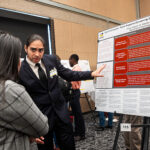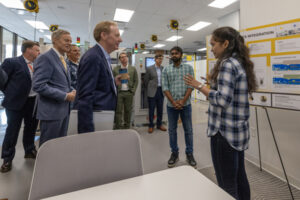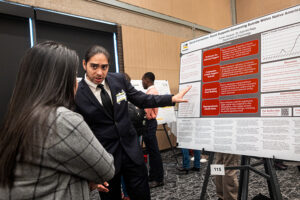Vibrant regional economies are associated with the presence of research universities that have strong partnerships with industry. That’s why UWM is building future-focused strategic partnerships with both local and international companies and engaging with them in new ways, Chancellor Mark Mone told a committee of the UW System Board of Regents meeting at UWM on June 3.
These alliances feed workforce needs and boost student skills, but also solve industry problems through joint research that is attracting millions of dollars of investment and improving society.
“Most of these partnerships are not just based in one school or college,” Mone said. “They involve many different components of the university. So, we’re setting the stage for the future in important ways.”

Partners also include community organizations, alumni and governmental entities, such as the Wisconsin Economic Development Corporation, said Jennifer Abele, senior executive director of UWM’s Office of Strategic Partnerships.
“We started by nurturing existing relationships with what I like to call our ‘Fab 4’ companies: Microsoft, We Energies, Rockwell Automation and Northwestern Mutual,” Abele said.
Over the past three years, six initiatives have grown out of “holistic” relationships in which UWM and its partners have become aligned in their missions.
For an initiative called Tech Ed Frontiers, for example, UWM is working with companies to produce online, on-demand learning pathways, or short courses, that enable employees to learn new skills quickly and advance in their careers.
The university consulted with dozens of businesses, asking them to help identify the right topics and the best way to deliver the skills to working adults. Currrently, pathways in data analytics and cybersecurity are underway.
“Surveys show that 50% of employees want to obtain more education after the pandemic,” Abele said, “but most aren’t going to get a full degree, although we’ve built in opportunities for degree completion. We think it’s the future of higher education.”
Another initiative, the Northwestern Mutual Data Science Institute, brings together Northwestern Mutual, UWM and Marquette University to cultivate a passion for data science in the Milwaukee region.
“Business, energy, entertainment, manufacturing, transportation… You name it, every sector needs and uses data science,” Purush Papatla, a professor of marketing and co-director of the institute, told the committee. “So, building the region’s strengths and providing a data science talent pool is a very good way of attracting employees to the region.”
At UWM, the institute is supporting the development of two degree programs that will allow students from any discipline on campus to build his or her skills in data science, he said.
Data science research is also a component. The institute is finalizing an agreement with NGC to work collaboratively on a project that aims to use data science to improve homeownership among minorities. The project will begin as a pilot project on the UWM campus, with the goal of building it into a national center that uses data science to advance homeownership among minorities.
Later during their meeting, the regents will have an opportunity to tour a new campus facility where another strategic initiative is underway. The Connected Systems Institute features a manufacturing testbed built by UWM researchers and industry partners that will help them accelerate the digital transformation of manufacturing and develop education programs for the workforce.
CSI industry partners, contributors and collaborators have raised over $8.3 million for the institute and its testbed in the last three years.
The other current initiatives being scaled up include:
HERA (Higher Education Regional Alliance) is a collaborative of 18 southeastern Wisconsin colleges and universities, and a network of partner organizations who are dedicated to closing student achievement gaps, increasing college completion rates and aligning educational programs to meet employers’ rapidly changing needs.
“Our number one focus is around getting more students to degrees or, as I like to say, more students to paychecks,” Mone told the committee.
M³ is a partnership among MPS, MATC and UWM that aims to increase the retention, graduation and career success of students and provide a prepared workforce for the Wisconsin economy.
The Freshwater Collaborative of Wisconsin connects the state’s 13 public universities, industry partners, local communities, policymakers and advocacy groups to train the next generation of water researchers and establish Wisconsin as a global leader in water-related science and technology.







